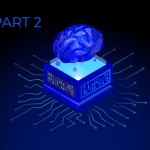Artificial Intelligence – future perspectives and drivers
Author: Winona Fischer
Estimated reading time: 10 min
Tired of reading? Let our lovely AI Amy read it for you:
Contextualization of AI
Artificial Intelligence (AI) and related emerging technologies based on it have changed and accelerated the business world faster than no other technology in the last couple of years.
More and more business decisions are now based on AI and machine learning predictions and patterns with an upward trend, but what is so crucial about it from a business point of view and how do most businesses make usage of it? In addition to that – how do the greatest tech players in the market get involved with AI, what do startups contribute in this fast developing scene and what potentials and impacts does AI have in the long run, professionally and personally? In two blog article parts we will put a light on the most important questions linked to these considerations about artificial Intelligence.
Significance and origin of AI
Elon Musk, well known Tesla CEO once said “I mean with artificial intelligence we’re summoning the demon.” With respect to the potential of AI he wants to stress his recommendation on the fact that AI should be accompanied with international regulatory rules in the future. Musk here refers to the high intellectual potential AI will have at some point which will exceed the intelligence of human beings in many different contexts. When referring to the term AI, one likes to define it as capability of machines to learn from experiences, the ability to perform human-like tasks and to adjust new inputs accordingly.
The term AI has first been used in the 1950s. Back then scientists, mathematicians and philosophers mostly researched the possibilities within contexts of problem solving and symbolic methods. In a paper called “Computing Machinery Intelligence” Alan Turing made the first real explanations about building intelligent machines and how to test them. Unfortunately computers back then were not developed well enough to deal with AI approaches, not even mentioning their weak data storage capabilities. In the 60s and 70s AI developed much further, due to the fact that computers now became faster, more accessible and cheaper. In the 1980s AI scientists further endorsed the concept of “Deep Learning”. The machine learning technique refers to the ability of computers to learn by example and experiences, just like human beings. Notably this is the key technology which makes autonomous driving possible, since it enables them to recognize traffic lights or detect obstacles on the street. After a decade of significant government funding in AI research projects, funding and public attention declined. Ironically, the absence of these fundings and public attention reached further achievements in AI. For instance in 1997 the first chess game won by IBM’s Deep Blue computer against the great chess champion Gary Kasparov, pushed up the usability of AI-based decision-making programs. Thanks to much greater improvements in computer hardware in the early 2000s AI kept developing, heading its way into the era of Big Data. Immense improvements in data processing and data storage enabled big commercial advantages for many big tech companies like Google or Amazon. Nowadays we have the possibilities to collect and store huge amounts of data, thus applications of AI have been increasing in many different sectors like technology, banking, supply-chain, marketing, entertainment and many more.
Business functions with AI today
As already mentioned, AI is influencing many different businesses today. Various functions of organization are on the move to implement AI technology, in order to not fall behind. Marketing, sales, human resources and maintenance operations are only a few of many to point on to.
In marketing AI can help out in many different ways. For instance it enables companies to sort customers according to preferences or demographic characteristics. This is possible due to the immense amount of data analytics, which gives marketers the opportunity to understand their customers’ needs and expectations beforehand.
Sales is another interesting business function affected by AI technologies. Especially when it comes to sales forecasting and predictions, AI always has the better answers based on data than humans could ever predict. In addition to that AI sales tools can help prioritize sales activities, to increase close rates and to boost sales productivity.
As oriented as human resources staff might seem, even here AI can help out a lot. Basic human resource tasks like recruiting can be optimized by AI technologies. For instance, data-based decision-making can help recruiters to screen new applicants. Also some companies use chatbots to answer frequently asked questions in the recruiting process. One great example here is the AI Robot named Vera developed by a russian startup called Stafory for PepsiCo. PepsiCo used Vera for the first time to make phone calls to applicants for sales positions to help out the HR department because of an immense amount of needed sales staff. Astonishingly Vera has the capability to make 1,500 interview calls within 9 hours, which would take a human something up to nine weeks.
Another big function in industries to point out here is the usage of AI-based technology in production lines and for maintenance. AI helps here to control, for instance, heating or cooling systems. With the installation of sensors, efficiency within the production and especially deviations in productivity can easily be tracked down and quickly adapt accordingly so that no time or resources are lost in production processes. Additionally AI can predict maintenance tasks and failures much more precisely. For example, Heineken is analysing their data at every stage of the production process from supply chain even up to the inventory stocks. Along with that AI decreases the immense amount of costs by detecting downtimes or problems before they even arise.
How the big four are involved (GAFA)
It is of no secret that especially the big four Tech companies well known as GAFA, referring to Google, Amazon, Facebook and Apple have a huge interest in knowing the ecosystem of consumers as precisely as possible in order to place their products perfectly in the market. GAFA are prominent in conversational AI, using their massive access to data to optimize customers’ experiences accordingly. As a result, new AI based marketing solutions are of great interest to GAFA.
In order to stay at the forefront of AI within their industry and to boost their market presence, GAFA have been acquiring many AI startups in the last couple of years.
As seen in the graph below and also by other more recent resources (February 2020), Google acquired most of the AI startup since 2009. The total of all AI acquisitions by Google since 2009 makes up a round number of 30 different companies, with estimated total costs of 3,876,340,000 US $.
Along with the acquisition of PittPatt in 2011, a facial recognition software company, followed by another big acquisition of DeepMind in 2014 for more than $500M to build up their expertise in Deep learning, Google’s quite recent acquisition of Onward in 2019 covered another AI field. Onward is a customer service automation platform that offers various customer service solutions based on automation and other sales tools for business contexts.
Just like Google, Apple is also joining the race of the AI acquisitions quite successfully with a total acquisition of 18 AI companies since 2009. For quite a while Apple used many different AI applications, such as identifying frauds in the App Store. Just like Amazon and Google, Apple is most likely known for its AI assistant Siri. In order to stay competitive in the market Apple did invested heavily in AI startups like Affective, which works on facial recognition technology and into the self-learning dialogue API, which has the capabilities to improve conversations between humans and devices.
Amazon also acquired up to 9 companies working in AI since 2009. Known for their big strength in the usage of AI for sales operations and customer relationship management, Amazon quickly understood something important in the market.
Indeed that consumption patterns are forming customers’ purchasing behavior significantly., and that AI solutions have the power to predict and refine these patterns. Notable also is Amazon’s AI-based speech assistant Alexa, which is also based on neural networks, making human-like interactions and conversations possible.
Lastly there is Facebook, which are also expected to increase their AI business areas further. With reported daily users of 1.73 billion people, Facebook is constantly working on improvements to their offerings based on AI solutions. Their algorithms are playing huge roles, especially within their advertising business. In addition to that Facebook also acquired AI startups like Scape Technologies, which builds computer vision applications for Augmented reality usage.
AI in the startup scene
As already seen, start-ups are taking on an immensely important role in AI innovation processes which catches the attention of the greatest tech companies. But what other startups are rising stars in the AI scene as of now? And which of them seem to be promising or maybe even very likely to get acquired by big tech giants in the future?
According to the Forbes Magazine there are 9,216 startups and companies listed in Crunchbase today which mainly build upon machine learning applications (April 2020).
“Artificial Intelligence-related companies raised $16.5N in 2019, driven by 695 deals” and Artificial Intelligence isn’t just a buzzword anymore, it is a crucial part of business with immense potential for growth. Therefore the Forbes Magazine pointed out 25 different promising Startups in April 2020 in which everyone in the scene should keep an eye on. We would like to introduce you to a couple of these in the following.
AI.Reverie is a synthetic data platform which produces virtually endless supplies of data for computer visions and machine learning applications. They are mostly useful for companies who want to improve their machine learning algorithms and to work on their AI accuracy and repeatability. So far the company has raised a total of $10M in fundings.
Secondly there is Comet.Ml. The company offers a self-hosted and cloud-based meta machine learning platform. With that platform data scientists can track, explain, compare and optimize experiments and models the way they want in order to bring more efficiency and transparency into AI and ML. Currently the company has already been working with firms like Uber, Google and Boeing and have already raised a total of $68M by now.
Another interesting startup is Eightfold.Ai. Their mission is to find the perfect career for everyone in the world. Very quickly they also stepped up to help decrease the unemployment rates due to the Covid-19 crisis. Offering a talent exchange solution based on AI Eightfold has already raised fundings of up to $85M.
Additionally there is a startup called Olive, which develops AI and Robotic Process Automation solutions that should help healthcare organizations reduce costs due to administrative errors and improve patients’ care and efficiency at the same time. They have already been raised $123.8M as of now.
Lastly pointing out the startup PostEra is interesting due to the fact that they are currently having a team of scientist do research to find a COVID antiviral. In general PostEra works with ML with the mission to close the design-make-test-cycle of drug discovery, plus reducing the clients cycle times. As of today, the startup has raised up to $2.5M in two rounds with a latest funding in the end of march 2020.
Wrapping it up with a small future perspective
To wrap up the little dive into the world of Artificial Intelligence for this part, the advances AI is making in our society today are growing exponentially. It is now on great entrepreneurs, developers, data scientists and other crucial roles in the field to make the right usage of it and to provide unprecedented solutions for tomorrow. As already mentioned in the beginning it can also be seen as important that the development of AI will always be aligned in receptiveness of humans and their associated privileges and rights on a legal basis. In some ways the commercialization phase of AI has just begun and ethical questions will put up barriers along the way, but it will immensely affect our world as we know it.
Reference
1. Forbes.com
2. https://www.sas.com/en_us/insights/analytics/what-is-artificial-intelligence.htm
3. http://sitn.hms.harvard.edu/flash/2017/history-artificial-intelligence/
4. https://www.mathworks.com/discovery/deep-learning.html
5. http://sitn.hms.harvard.edu/flash/2017/history-artificial-intelligence/
6. https://towardsdatascience.com/history-of-ai-484a86fc16ef
7. https://www.forbes.com/sites/bernardmarr/2020/03/30/10-business-functions-that-are-ready-to-use-artificial-intelligence/#34893b8a3068
8. https://www.marketingaiinstitute.com/blog/how-to-use-artificial-inteligence-for-sales
9. https://www.forbes.com/sites/bernardmarr/2019/04/05/the-fascinating-ways-pepsico-uses-artificial-intelligence-and-machine-learning-to-deliver-success/#6ba471ba311e
10. https://www.forbes.com/sites/bernardmarr/2020/03/30/10-business-functions-that-are-ready-to-use-artificial-intelligence/#34893b8a3068
11. AI in Marketing, Sales and Service: How Marketerswithout a Data Science Degree can use AI, Big Data and Bots. – Peter Gentsch (2018)
12. https://www.information-age.com/google-revealed-acquired-most-ai-startups-since-2009-123487752/
13. https://techcrunch.com/2011/07/22/
14. https://www.crunchbase.com/organization/agent-q#section-overview
15. https://pubosphere.fr/gafa-tomorrows-ai-and-emotional-marketing/
16. statista.com
17. https://www.forbes.com/sites/tomtaulli/2020/02/15/facebook-ai-artificial-intelligence-will-ma-help/#5d1c69857664
18. https://www.forbes.com/sites/louiscolumbus/2020/04/26/top-25-machine-learning-startups-to-watch-in-2020/#77c056511f52
19. https://www.pwc.com/us/en/moneytree-report/assets/pwc-moneytree-2020-q1.pdf
20. https://aireverie.com
21. https://www.forbes.com/sites/louiscolumbus/2020/04/26/top-25-machine-learning-startups-to-watch-in-2020/#40b635151f52


